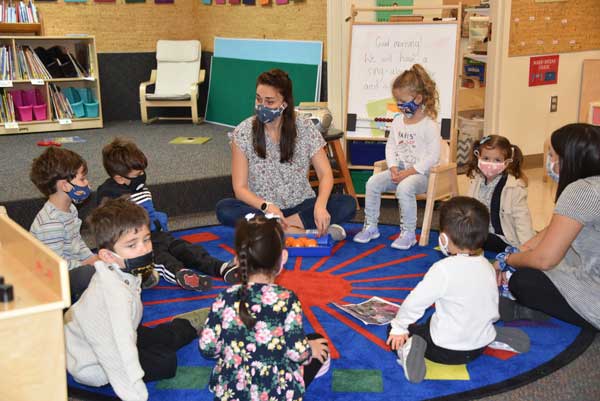A Q&A with Lauren Mactas, Head of Early Learning
In September, Chilton House opened its doors to its 2s program, embracing founder Elisabeth Morrow’s educational philosophy in educating even the youngest of learners.
Why is it important to introduce an early childhood program for students as young as 2 years old?
Mactas: Anyone who has spent time with a 2-year-old knows that they are deeply curious. They want to get into everything – touch things, taste things, climb into things. They are extremely devoted to learning how their world works. They are also learning to use verbal language at a rapid pace. It is a formative, exploratory age that deserves to be celebrated and nurtured in an environment that encourages these natural traits and helps young children become driven learners.
What makes the program at EMS so special?
Mactas: EMS has a deeply unique culture in which children take ownership of their learning from the moment they step foot onto the campus. Starting in the 2s, children take joy in taking responsibility for their classroom and themselves. They seek out their peers to help problem-solve and collaborate. What emerges is a motivation to work together and care about each other. When you start to instill values and understandings when children’s minds are the most formative, you develop life-long learners who strive to know more, ask more, and aim high.
Why is engaging parents in their child’s education an essential component of a student’s learning experience?
Mactas: Children are experiential learners, and every environment in which they spend time is a learning space. School, home, the playground, a grocery store – all of these places offer experiences that shape children as students. Knowing that, our partnership with families is key because we each provide a unique set of learning opportunities that collectively contribute to a child’s growth. We are continuously grateful for the partnerships we foster with families.
What are the benefits of teaching children in a culturally diverse community?
Mactas: A young child’s exposure to diverse cultures, religions, languages, races, families, ideas, and feelings promotes empathy, community, social growth, and the ability to not only respect but celebrate those different than ourselves. It also encourages the drive to understand others and be intellectually flexible. These are traits and skills that are critical to having a successful and rewarding educational experience, and looking ahead to a successful and rewarding professional life.
How have our early childhood and kindergarten programs evolved in remote learning?
Mactas: We certainly couldn’t have anticipated that we’d have to pivot to remote learning in the spring. I often say that it was “magical” how efficiently and thoughtfully our faculty were able to do this. However, it wasn’t magic. It was a deep understanding of child development and a commitment to keeping children connected. We relied deeply on our understanding that young children need to feel valued, heard, and seen. We also knew that all young children respond favorably to a reliable routine and consistent expectations. Our remote learning was designed and implemented to reflect individual student comfort levels and virtual learning stamina.
What are the ways that the Chilton House faculty teaches the 4 Cs – courtesy, consideration, cooperation, and compassion?
Mactas: Our faculty teach through modeling. The 4 Cs are not concepts formally taught. They are embedded in every activity and every interaction. The motivation to be kind, thoughtful, and empathetic becomes ingrained in each student as they move through Chilton House.
Can you share a story that you feel is an excellent example of/demonstrates the Chilton House learning environment?
Mactas: I can think of so many stories, but the greatest example of the magic of Chilton House is what we overhear children saying every day. In every classroom, you hear children say, “Let me help you,” “I can do it!” or “Let me try again.” The Chilton House community encourages autonomy, self-advocacy, resilience, and collaboration. These are traits that we need to be successful adults, yet these children are already learning to master them! Imagine the learning possibilities when young children are empowered from the beginning to be resilient, take risks, and support each other.
What skills do students in Chilton House learn, and how do they prepare them for lower school?
Mactas: Chilton House students are learning to “become” students. They are developing habits of learning and habits of mind. They are learning how to collaborate, how to negotiate, and how to prioritize. They are learning how to take turns and take responsibility for themselves. These traits are very important in the early years but will take on an even higher level of importance as children move into Little School and are empowered to take on more challenging work.
How is our 14-acre wooded campus able to enhance an early childhood and kindergarten education?
Mactas: We feel so fortunate that our children have access to such an expansive learning landscape. We see our campus as an extension of the classroom, offering children a dynamic space to explore and discover. When students are immersed in their learning, that learning becomes deeper and more impactful. When children don’t just learn about a groundhog but watch a groundhog family burrow into a hole right before their eyes, learning becomes alive.
What are five words you would use to describe a Chilton House child?
Mactas: Curious. Thoughtful. Playful. Determined. Caring.


